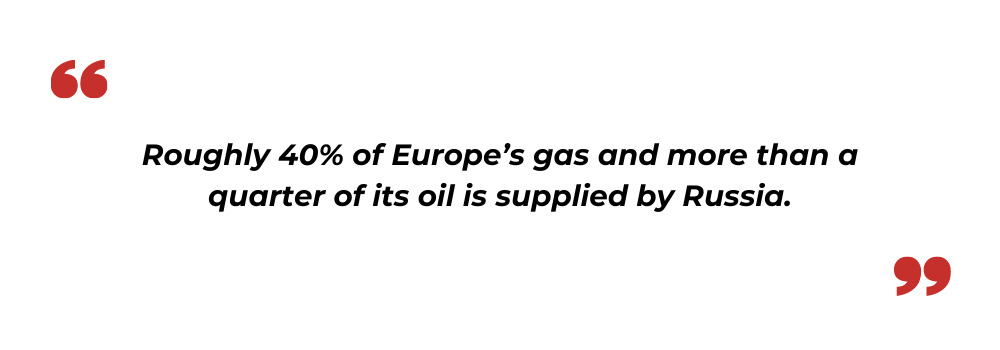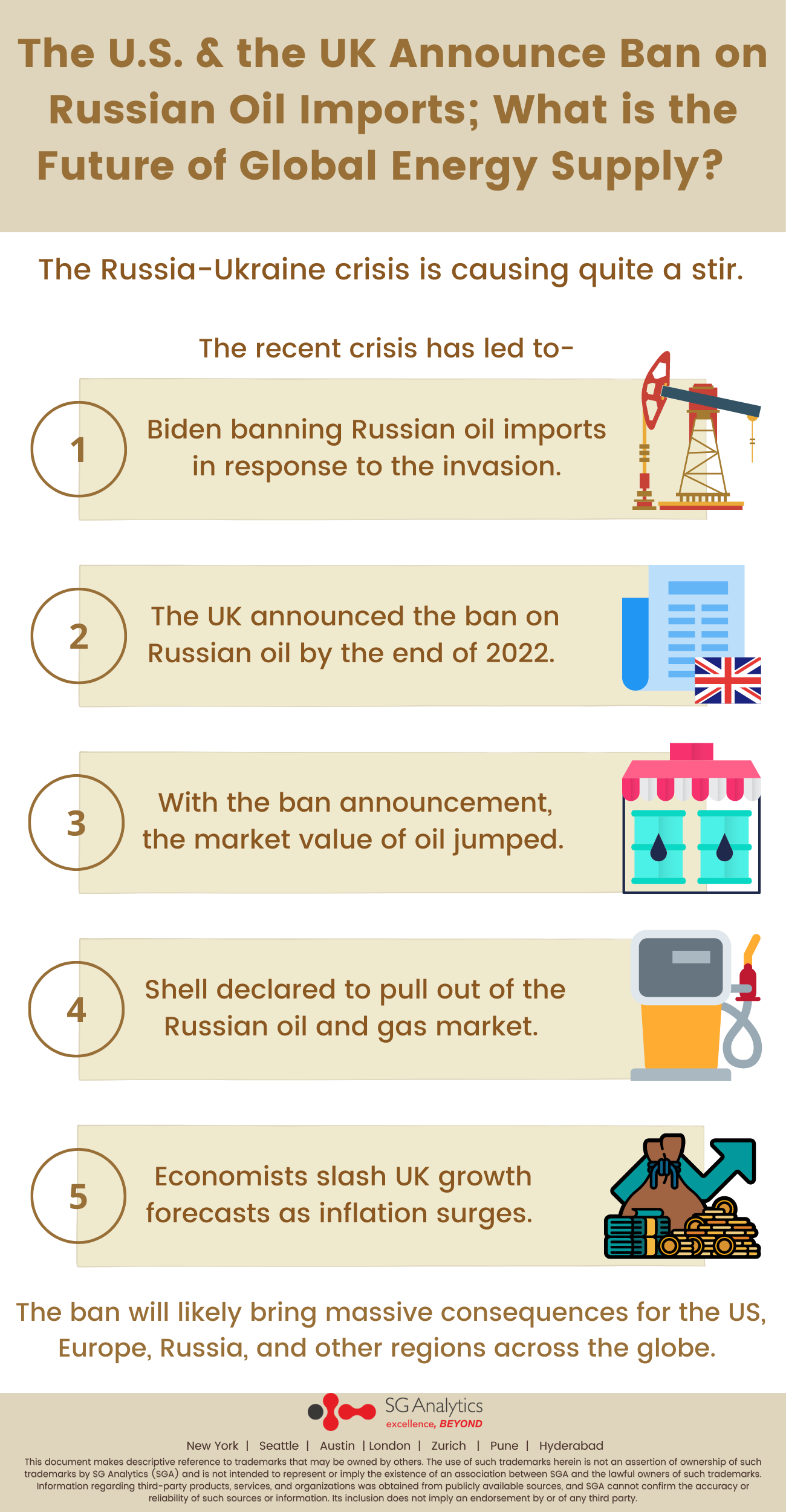The latest development has been causing an eye-popping surge in energy prices since the invasion of Ukraine. This has thrown energy markets into disarray, and the world is now bracing for a major inflationary shock. The global oil and natural gas markets have turned on their heads in the past month, but the full impact of the turbulence is getting visible slowly.
The volatile backdrop of the oil industry is being deemed as the most important development of the year. The recent events will likely change the course of global geopolitics and decide who will dominate the roost.
Understanding the Scenario
U.S. President Joe Biden announced a historic ban on Russian oil imports, the latest round of sanctions against Russia following its invasion of Ukraine. Stocks plummeted, adding to the losses - following the announcement. This move sent oil prices soaring to nearly $130 per barrel. With energy prices continuing to surge, experts are now warning of a rise in inflation and a gradual fall in economic growth.
As the conflict is dragging on, Biden issued a statement saying the United States is targeting the main artery of Russia’s economy by restricting oil and gas shipments from that country. The ban also highlighted the prohibitions of U.S. investment in Russia’s energy sector. This beginning of new sanctions will lead to a potential global realignment in the energy sector.
With Biden's government pushing the sanctions against Russian energy will likely give rise to higher inflation levels, as high oil prices and inflation are strongly correlated. A major industrial input, oil, is used in the production of vital goods and commodities, including diesel, gasoline, and asphalt. The slash in purchases of crude and response to rising prices will adversely impact administrations tenuously across the globe.

Understanding the role of Europe in this situation
After the U.S., the United Kingdom also declared it would phase out Russian oil imports by 2022. With the U.S. imposing the sanctions, European partners and its allies are identifying coordinated ways to prospect the ban on importing Russian oil.
The bombshell announcement on March 6th, by America’s Secretary of State, set the global oil markets ablaze. Within the following hours, the price of West Texas Intermediate (WTI), the American benchmark crude, plugged by more than 9%. There is new speculation that oil prices would touch $200 a barrel.
If European countries are to follow the path taken by the US and ban Russian oil and gas imports, the Russian economy would feel the effects, but Europe will likely experience the ripples as well. The EU gets about 40% of its gas and 30% of its oil from Russia and does not have an easy substitute if Russia decides to disrupt the supply. If some European countries decide to sanction Russian energy, the Russian spokesperson presented that Russia may close its main gas pipeline to Germany.
While the US is exploring the potential ban, Germany and the Netherlands choose to reject the plan. With China & India still being possible points of contact for Russia, it is safe to say that Russian exports will not simply disappear from the global crude market even in the circumstance of a European embargo.
Read more: Russia-Ukraine Crisis; Global Stocks Plunge; Inflation Risk Looms; What’s Happening?
Countries across the globe consume 100 million barrels of oil every day. Russia supplies 40% of Europe's gas. It is also the world's top exporter of crude & oil products combined. The price of oil has jumped again, considering an embargo on Russian imports.

Key Facts
- The Dow Jones Industrial Average plummeted by 0.6%, nearly 200 points. The S&P 500 rose 0.7%.
- Wall Street experienced a steep sell-off, with the S&P 500 plunging nearly 3%, its biggest drop since 2020. Nasdaq lost 3.6%,
- Everything from oil, natural gas, and precious metals have surged due to the rising conflict between Russia-Ukraine, leading to a slowdown in global economic growth.
- In the U.S. market, investors are becoming risk-averse, turning to safe-haven assets amid the rising fears arising due to soaring energy prices.
- Oil prices continued to jump as Biden announced a ban on Russian oil imports. The global benchmark Brent crude is trading at around $129 per barrel.
- Russia is warning that oil prices could surge to around $300 per barrel if the West continues with the ban on its energy exports.
What Does the Future Hold?
The new announcement of the U.S. imposing a ban on Russian coal, natural gas, and oil imports will lead to catastrophic consequences for the global market. While Russia accounted for 3% of U.S. oil imports in 2021, it also made up 21% of America's gasoline imports in the same year. The announcement has led to commodity prices surging even higher, with U.S. gas prices hitting a new all-time high price.
The coordinated cut-off by the West will be more effective. While the U.S. announced the ban on Russian oil and particularly natural gas, the impacts will be much more profound on European allies, who have not taken any steps to impose a similar ban. While Europe heavily relies on Russian for energy imports, the sanctions will severely disrupt the global energy market.
Read more: Improved Targeting, Sustainability, and Validity: Market Research Trends for 2022
The rising crisis is leading to a pivotal moment for global energy markets as demand is increasingly stretched, coming out of the pandemic. The spiking prices of oil and natural gas, particularly in Europe, raise how consumers and producers will respond to the rising era of new geopolitical upheaval. The widely supported ban by the domestic public will exacerbate decades-high inflation and lead to sluggish economic growth.
The world is now preparing for a worst-case scenario, where further restrictions will likely be placed on Russian energy markets, leading to their isolation from global markets. Oil prices will surge to more than $150 per barrel for a sustained period. The impact of surging commodity prices will lead to a deadline of 0.3% decline in the U.S. in 2022, as per the estimates reported by Goldman Sachs and Bank of America.
While Russian energy represents a small fraction of American imports, the ban may give rise to troubles in exporting oil even in the absence of sanctions. This short-term pressure escalating from energy sanctions will be felt equally by t e U.S., Europe, Russia, and other countries.

Conclusion
The wall of sanctions, following Russia's assault on Ukraine, on exports of technologies to Russian refineries, has led to a price jump leading to ripples being created in the energy market. This fundamental shift due to Russia's invasion of Ukraine is increasing the inflationary pressures, which are likely to elevate longer than expected. This will ultimately affect the economy, leading to a fall into a recession at some point over the next coming months.
While Russia was already facing heavy economic sanctions from the West, the new ban on energy markets will lead to a surge to around $300 per barrel if new restrictions are imposed. Ultimately the economy will plunge into recession due to the sanctions leading to catastrophic consequences.
The threat of this action will bring along the worst consequences for both worlds, forcing prices to go up and revenue flows to seize. The energy markets have been volatile over the past weeks. With genuine fears raising to the sanctions being imposed on oil and gas supplies from Russia are likely to add to this situation.
Despite the pressures from the US, Russia is threatening a tit-for-tat ban. While such ban is unlikely, one uncertainty still prevails-
Will Russia's counter-threat lead to making the situation worse than it already is?
With offices in New York, San Francisco, Austin, Seattle, London, Zurich, Pune, and Hyderabad, SG Analytics, a pioneer in Research and Analytics, offers tailor-made services to enterprises worldwide. A leader in Market Research, SG Analytics focuses on helping organizations achieve actionable insights into product, technology, customers, competition, and marketplace to make data-driven decisions.
Contact us today if you are looking to make critical data-driven decisions that stimulate accelerated growth and breakthrough performance.









